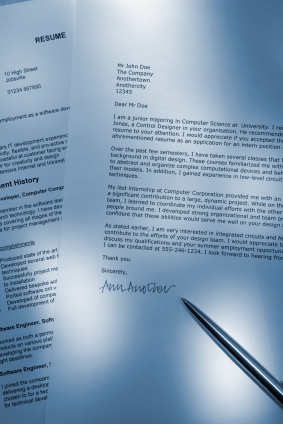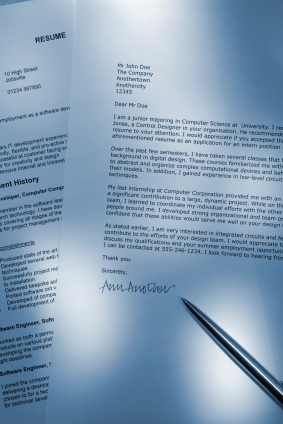
Many job seekers stress over cover letters more than they do their own resumes. It may surprise some, besides cover letters are typically a one-page preface to your intricately prepared resume. But, the truth is, that your resume may look dull without a good cover letter to introduce it. Cover letters introduce you to HR managers and set the tone for how your resume will be received. You can have a perfect resume, but if the cover letter is not well done, then your resume will not get the type of attention it deserves. Everyone looking for a job should have a professional cover letter and resume in order to find the career that’s right for them.
When you first enter the job market (most of us at around 21 years of age) don’t know how important cover letters are for you, much less how to write one that sells you. Many people are not aware of the benefits that a simple, well-crafted cover letter to a prospective employer can have. They introduce you to your prospective employer, but also they give a glimpse of your personality.
Just a few weeks into your job search, you will realize that a well-crafted cover letter is not an option, it’s a necessity. Through the support of a professional resume and cover letter writer, you can finally have the cover letter that sells your individual personality and traits. If you have a cover letter, it could always use another eye on it in order to see where you can make changes or additions. You want to sell yourself in your cover letter, your resume speaks to what type of experience and qualifications you have, that’s why it’s important to have a cover letter that sets you apart.
But, just having one is usually not enough. After a few weeks or months of unanswered applications and fruitless job searches, you begin to come to a final conclusion.
When you, or your cover letter writer, writes your first letter, the primary focus is on presentation and the format. How long should the cover letter be? Where to assign the date? What type of font is right for my cover letter? But, throughout you want to focus on one thing – quality content. If your cover letter is full of buzz words or just inane babble, then it’s not worth the paper it’s printed on.
It’s always important to remember, before you start writing, that content is king. It’s fairly easy to lose sight of what’s important and lose focus instead of paying attention to what’s important. That doesn’t mean that there are not guidelines to follow, but your cover letter writer can help you deal with the details. You do not want to have spelling or grammatical errors in your cover letter. That’s an instant turn off to any prospective employer. Remember that the main point of your cover letter is to get noticed and sell yourself.

The following is a guest post from careers writer, Brendan Cruickshank.
++++
The idea is such a joke that there is now a book out by this name, Overqualified by Joey Comeau. Comeau writes cover letters to send with resumes, but they are not your run of the mill cover letters. Instead, they are outrageous, over the top cover letters. Comeau writes cover letters that say things like “It sounds like the sort of job that I don’t even need to think about while I’m doing it,” and “I have been programming Perl for eight years, on every business appropriate platform there is, and I’ve been around long enough to understand that there are no human beings reading this.” Comeau writes his letters as a joke, but as with all jokes, there is a kernel of truth here.
And the truth is, people who are overqualified for a job get cynical and jaded. Please don’t apply for or take a job for which you are overqualified. Even if you are hired (and most employers know better than to hire someone who is grossly overqualified), that job will not only make you unhappy, but make everyone around you, at work and at home, utterly miserable.
Good human resources managers know this already: an underqualified and inexperienced candidate is preferable to an overqualified one any day. Why? If you are underqualified, but enthusiastic about a job, you can and will learn how to do it. Learning the job will give you a challenge – and employees who are appropriately challenged are a joy to be around. They approach their work with creative, open minds. They don’t bring with them any preconceived notions or entrenched bad habits that they learned from previous coworkers or managers. Most importantly, they are not burned out.
If you lack experience for the work that you are applying for, don’t try to hide that fact. Instead, play up the advantages: you are enthusiastic, eager to learn, bright, open, full of energy and ideas. Once you get to the interview stage, it will be relatively easy for you to show your enthusiasm for the job. But in your resume, it is harder. If you want a potential employer to notice your energy and enthusiasm, and ask you in for an interview, use your resume to highlight the experience that you do have, and to point out areas of your life in which you show tremendous energy and motivation, even if those areas come from volunteer work, internships, extracurricular activities, or sports that you participate in.
Then, write a compelling cover letter – not a Comeau-esque letter like the ones I’ve quoted above, but a letter that shows your personality and the ways in which you are personally a good fit for this kind of work. Take a humble approach. Write about what you think you can learn from the job you are applying for – what you can learn from your supervisors, from your colleagues, from the company itself. This might sound like a risk. It might sound as though you are highlighting your own lack of experience. In a sense, you are, but that’s okay. What you are really doing is showing that you are ready for something new – and that you are smart enough to recognize a good opportunity when you see it. Have you ever heard the expression, “flattery will get you everywhere?” Flattery may not get you everywhere, but in a good cover letter, it will get you in the door for an interview – and that’s exactly what you need it to do.
—
In his 8 years in the job search and recruiting industry, Brendan has served in senior client services roles with major sites like Juju.com and JobsInTheMoney.com. He has been regularly quoted on topics such as employment as well as jobs. His opinions have appeared in the Wall Street Journal and US News & World Report as well as other major publications.
Top 5 Ways to Increase Your Chances of Finding Employment
Career & WorkplaceCover LettersJob SearchNetworkingProfessional ResumesResumes
When you’re out of work, you need to use every advantage you can think of to increase your chances of finding a job. With today’s fluctuating job market, there are more people applying for the leftover jobs than there are jobs available. This makes finding a job incredibly difficult. Of course there are some things you can do to help improve your chances of finding a job.
Make finding a job a full-time job
- If you are looking for a job, then you probably spend most of your time looking for a new job. While you’re looking, it can become tempting to watch TV or browse the internet. But, instead set a schedule for yourself and follow it. Every day your schedule should reflect your job-hunting efforts.
Start working on your resume
- You need a resume that will stand out above the mass of people applying. The average hiring manager spends between 10-20 seconds reviewing a resume, so it has to be eye catching to get noticed. You want to have more than one resume when applying for jobs, so it helps to have professional resume writers review your resume and make needed changes. Depending on the job you’re looking for, you will need to highlight different aspects of yourself on your resumes. Professionals are great at creating different resumes for every client.
Don’t skimp on the cover letter
- Think of the cover letter as a quick handshake introduction to a prospective employer. Your cover letter should be unique to the job you are applying for – don’t send out a cover letter addressed to “Sir or Madam”, you want it to be personal and show that you put some effort into the process. Highlight your skills that will set you apart from other prospects, and never, ever use a generic cover letter. HR managers can spot those a mile away.
Get your networking on
- Networking is a great resource for professionals seeking employment. With websites like LinkedIn and Facebook, you can connect directly with people in your industry, in the area that you wish to find employment. Let people know that you are looking for a job–there’s no shame in asking if someone is hiring. Other professionals can often connect you with HR managers when your skills are qualified. But, you need to do more than just network online, get out and go to some networking clubs or events. You can meet more people over a drink than you can with blasting out your resume to Facebook friends.
Start expanding your search
- Sending out resumes in one industry may have worked in the past, but that’s simple not the case, today you have to be well versed in many different fields. You never know what your next platform for success will be. If you have experience in marketing, then your next career may be in sales or advertising. Just try to branch out and see what’s out there.
Women Going Back to Work After a Baby
BlogCareer & WorkplaceCover LettersFamilyInterviewingJob SearchProfessional ResumesResume WritingSalary

Many women choose to stay at home for several years after having children. While this time frame varies, it always creates a period of time during which you had no ‘real’ job. Once a mother is ready to go back to work, one of the first problems they face in deciding how to write a resume that not only accurately describes their professional experience and career but also properly addresses extended maternity leaves. By using tact and creativity while remaining professional, it is often possible to ‘spin’ an extended leave for the purposes of resume writing and interviewing.
Be honest. Some job seekers mistakenly believe that extended maternity leave is an automatic black mark. Because of this, some lie and claim they were self-employed during their maternity leave. This is a patently bad idea. While it is unlikely that a future employer will investigate the claim, lying during the job seeking process is unethical and can lead to problems down the line. Instead, be honest about your extended work leave. I have found that all hiring managers want is an answer. Where were you all that time? On an extended vacation? Watching Oprah? In prison? They just want to know about the gap.
There are two ways to present extended work leave during the resume writing process. The first is to simply include one or two sentences in the cover letter explaining the reason for your extended leave, the birth of children, and that you are ready to re-enter the work force. Job seekers who opt for this option should keep it short and focus on logical reasons versus cute stories about their children (please don’t do that). Remember to keep it professional.
A second option is including your work leave directly on your resume. Some job seekers have had success by including their responsibilities and skills used during their extended leave. Scheduling, organizing and multi-tasking are just a few of the skills new mothers hone during their absence from work. These skills, and others, can be beneficial in the work environment.
Unfortunately, the human resources community is divided on the subject. While there are laws governing hiring practices, the truth is a resume and cover letter is your first and often only chance to sway a hiring manager to meet with you. While an extended leave of absence for child care reasons may be admirable to some, actually giving the job seeker a leg up, other hiring managers may shy away from resumes that do not adequately cover the subject.
The best advice may be to carefully research the company and hiring manager for each job you are submitting your resume for and to craft a specific resume and cover letter for each job. Carefully reviewing a company website and Internet research may very well give you inside insight into the company and their practices.
Finding a job after an extended maternity leave can be a long process. In fact, it seems like the longer you were out of the workforce, the longer it takes to become employed again. Try focusing your efforts on professionally representing your time off and be as honest as you can. Remember that finding a job is a job in itself so stay positive, craft custom resumes and cover letters whenever possible and use your interview as a chance to really showcase what you can offer the company.
Cover Letters: Are They Needed Anymore?
Career & WorkplaceCover LettersExecutive ResumesJob SearchProfessional ResumesResume KeywordsResume Writing
Contrary to the occasional rant about them, cover letters never go out of style. In fact, they should be considered one of the most important elements of the job seeking process. Unlike the resume, a rather cut and dried dissertation on your experience and training, the cover letter is your chance to convey more than simple experience. Understanding the important areas that need to be covered in a cover letter and the importance of creating unique letters for specific positions will allow you to take advantage of the strengths of the cover letter.
Length Matters
First, recognize the importance of appropriate formatting. Cover letters that are too long will quickly loose the interest of the reader while those that are too short will not convey the necessary information. Instead, be cognizant of the length and format of each cover letter. Each cover letter should be no less than three paragraphs long and no more than one page long. Not only is this length considered correct, it will allow you to appropriately address important areas adequately.
It Isn’t Your Resume
It is a mistake to simply use the cover letter to restate the facts that appear on a resume. Instead, the cover letter should be used to build interest–telling a little more about yourself and what you bring to the reader. An effective way to build interest is by expounding on an accomplishment that can be found in your resume. Instead of simply restating the accomplishment, give the prospective employer more details – details that will build interest in you.
Be Specific
Many make the mistake of creating a generalized cover letter. Addressing a cover letter to the HR Department, utilizing generic job names and including general examples is a patently bad idea. Instead, take the time and do some research. Even if you are sending a resume and cover letter to be filed for a later position, it is critical that it be addressed to the specific person in charge of hiring for that position. Each resume that is sent out should include a cover letter that is specific for a particular job offering.
What’s Next
When concluding your cover letter, be sure to include your next step. You may want to inform the reader that you will call to confirm receipt in a week or let them know you will call to ensure they have all the information they need. Including a follow up action is the best way to ensure that your resume will be flagged for follow-up by the reader.
Cover letters are a good idea almost any time you are submitting your resume for review. There are a few distinct cases when a cover letter is not required.
- When the potential employer requests no cover letter be sent.
- When working with a headhunter.
- When using resumes at a job fair.
It is important that each cover letter be written with a specific job in mind. Carefully read and review not only job postings, but also any information that is available regarding the company to which you are applying. Doing so will allow you to craft a more effective cover letter – one that is more likely to generate a call back. You can tweak your main cover letter for different positions. Be sure and save each version with a different title so you can easily pull it up when a similar job position opens up.
How to make your cover letter unique
Cover Letters
Your cover letter is your first impression with a company, even before an interview occurs. There is some debate among job seekers now about the importance of cover letters, now that email and online applications have replaced postal mail. However you apply for a job, though, a cover letter is still very important, and making yours stand out from your competition is equally important. So how can you make your cover letter unique, without looking desperate for attention? Here are a few guidelines to writing an effective cover letter that presents your personality in a way that sets you apart from the competition.
Don’t use a template : The most effective way to write a unique cover letter is to avoid templates or form letters. Not only will the reader be aware that you’ve put some thought into your introduction this way, but it will also open you up to different formats that will allow you to express your thoughts in the most concise manner. Maybe you want a bulleted list of keywords at the top, or you have particular experience in an aspect of the job, and want more time to explain – don’t pigeonhole yourself into skipping it because it doesn’t fit a pre-made template.
Make the cover letter appropriate for a quick scan : Sure, you want to tell a potential employer all about why you’re the best, but chances are the HR staff doesn’t have time to read 50 individual cover letters. Make your letter easy to digest with a quick 5 second eye scan. Include your skill set in an easy to read bulleted list at the top, or format your letter with the main points in bold text. People start skimming when they hit a block of text, so tell their eyes where to go. Make sure they can see all the most important information within 5 seconds of opening your email.
Remind them that this is just a highlight of your full resume : The point of the cover letter is to tell the employer at a glance why they ought to bother looking at your resume. So don’t forget to remind them that it’s attached.
Include links to your information in a clickable format : You may not have your own website, but you probably (and should) have a LinkedIn profile. Even better, you may have a work appropriate, or industry related blog. Use these to let employers get to know the real you. Let them see that you’re an expert in your field by sharing a blog you’ve created, or an article you’ve written. Let them get a glimpse of you that’s deeper than the resume. This is important though, make any links clickable. They probably won’t bother typing in a URL.
Make your text catchy, just in case they do read it : If you have interested an employer enough that they read your full cover letter (keep it short, though), then make sure that what you do write is well written. Aside from making sure it’s grammatically perfect, make it an interesting read, too. Add a bit of humor, or a clear opinion about something. If your cover letter is just rote information, then it’s no more informative than your resume.
The five biggest mistakes you can make on a cover letter
Cover Letters
Your cover letter is one of the most important documents you will write in your job search. Some argue that it’s equally as important as the resume. Of course, every job will place a different amount of weight on the cover letter, but however important the cover letter is to an employer, there are some mistakes that you absolutely should not make. Here are some of the common pitfalls to avoid when writing your letter.
Mistake – Bad spelling or grammar
This mistake is the most common, and what makes it so grievous is the fact that it’s completely avoidable. There is no excuse for bad spelling or grammar in a cover letter. If you’re not sure it’s perfect, have someone read over your work before you send it. You don’t get a second chance at a first impression, and grammar mistakes in a cover letter tell an employer that you aren’t paying attention at best, and that you’re uneducated at worst.
Mistake – “To Whom It May Concern”
While some form letters are written very well, they won’t really help you show that you’ve done your research on the company. Never let your cover letter be generic. Use a last name in your address if at all possible. The ‘To Whom it May Concern” intro just shows you don’t know how to pick up a phone and call to see who the hiring manager is, or you don’t know how to use Google. If you absolutely cannot find the name of a person in the company, make sure the address at least fits the position. For example, if you’re applying for a sales job, try “Sales Team Hiring Manager”.
Mistake – Using the company to further your own goals
Remember, that any employers wants to know how you will be an asset to the company, not the other way around. Don’t use your cover letter to explain how the company will help you achieve your dreams of being a clerical assistant. Explain how your particular skill set will increase productivity, and how your work in the past has demonstrated this.
Mistake – Leaving it all up to the employer
Don’t end your cover letter with a line like “I hope to hear from you soon.” This takes things out of your hands. You want full control over the situation. Instead, say something like “I will email again on X day to arrange an interview.” If you’re not bold enough for this, at least make a commitment to follow up with the employer. Just be sure that if you set up a time for follow up, you comply without fail.
Mistake – Ignoring the job posting
The job posting ad may have important instructions about how to submit a resume, and what needs to be included. If you ignore the ad, you run the risk of missing critical information, and having even a perfectly written cover letter ignored.
 Cover letters seem to be difficult for people, even resume writers. Why is that? What makes a good cover letter?
Cover letters seem to be difficult for people, even resume writers. Why is that? What makes a good cover letter?
Cover letters can be fun to write. There really aren’t many ‘rules’ to writing them. You can let your personality shine through. They allow you to positively present your skills, accomplishments, and credentials in a way that will encourage the reader to want to read even more about you (and then move on to the resume). There are lots of things I can get into in more depth (types of resumes, scope, presentation, who your audience is, etc.) but for now, I am just going to touch on the basics. In future posts, I will dissect cover letters more closely.
Here are some easy ideas to keep in mind when writing your cover letter:
- Make sure your intention is clear. In other words, what is the job you are applying for? Clearly state it. Don’t make the reader guess. You could say something like, “…and this is why my qualifications make me a perfect match for the Sales Management position”.
- Highlight your top achievements. You don’t have to rewrite everything you wrote in the resume, just summarize some of your top accomplishments. Wow them with what you have done.
- Add your relevant skills or qualifications. Let the reader know what you excel at and what you are capable of. This is a great place to talk about any extra credentials or training you’ve had that relate to the position.
- Write toward the position you are applying for. When preparing the cover letter, keep in mind the requirements of the position and add your qualifications that match them.
- Explain what it is you like about the company. Remember, you are trying to woo the company, so tell them what you like about them. Is it the reputation, products/services, location? Let them know why you like them.
- You are not writing your autobiography. Keep it short, simple and factual. You don’t need to go into why the last job didn’t work out, “…my boss had unrealistic expectations of the staff, so I decided to check out my options…:. Don’t air your dirty laundry or obvious dislike of your most recent employer. Keep it professional.
- Double check the entire document for accuracy, errors, and syntax. You don’t want to miss a great opportunity because you wrote, “Dear Hiring Manger”.
Another tip is to save that cover letter, copy and paste it onto a new document, and tweak it for another type of position you may be interested in. I encourage clients to have several “focused” cover letters for different positions they might have in mind. This way, if an opportunity presents itself, you are ready!
